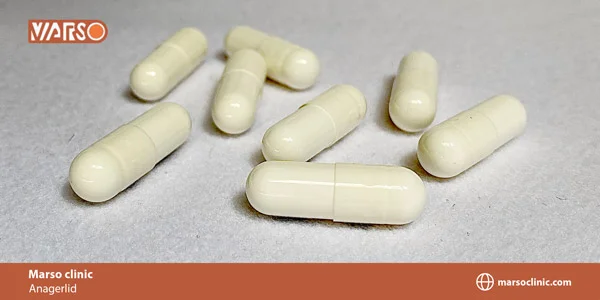General Persian name: Anagerlid
General English name: Anagrelide
Brand: Agrylin
Application: Treatment of problems related to blood clotting or unwanted bleeding – reduction of platelet production
what you will read next :
- Anagrid drug forms
- The correct amount and method of taking Anageride
- Contraindications to Anagrid
- Anagrid use during pregnancy and lactation
- The effect of Anagrelide consumption on driving
- Anagrelide drug interaction
- Warning about taking Anageride
- Side effects of taking Anageride
- Side effects of anagrelide overdose (Anagrelide poisoning)
- Storage conditions of Anagrelide
Anagrid drug forms
Capsule
Anageride Drug Information Capsules
Anageride is used to treat certain blood problems (thrombocythemia), which are caused by an overproduction of platelets by the bone marrow. Platelets are blood cells that the body uses to make blood clots. Excess platelets can cause problems with your blood circulation, including problems with unwanted blood clots and bleeding problems. Anageride reduces the number of platelets in the bloodstream by blocking platelet production.
The correct amount and method of taking Anageride
Read the package leaflet carefully before starting treatment with this medicine. This brochure will help you to get information about the drug and its possible side effects.
The dose and amount of Anagrelide varies from person to person; Use the medicine exactly as your doctor advised.
It is usually given 2-4 times a day, but you should not take more than 2.5 mg in one dose and more than 10 mg during the day.
Take the medicine regularly and at a set time.
The patient’s condition and platelet count are monitored during treatment and 3-4 days after receiving the dose to determine the treatment process.
Contraindications to Anagrid
Pay attention to the expiration date of Anageride and do not take it if it has expired.
Never give Anagrelide to another person, even if you have the same symptoms.
Check for drug interactions with Anageride, and if you are taking a drug that interacts with this drug, talk to your doctor about using your medications.
Anagrid use during pregnancy and lactation
During pregnancy and lactation, you should not use the drug arbitrarily without consulting your doctor. If you need this medicine in certain circumstances, your doctor will prescribe Anagrelide for you after careful examination.
The effect of Anagrelide consumption on driving
Anagrelide can make you feel dizzy, and if you have these symptoms, avoid driving or operating machinery.
Anagrelide drug interaction
It may alter the performance of medications and increase the risk of serious side effects. Do not change the dose of your medicine without consulting your doctor or stop taking the medicine. Make a list of all the medicines (including prescription / over-the-counter and herbal medicines) you use and share them with your doctor and pharmacist.
Some medications that may interact with this medication include: Other medications that can cause bleeding (including antiplatelet drugs such as clopidogrel, “blood thinners” such as warfarin / enoxaparin), and sucralfate.
Use aspirin only if your doctor approves. Aspirin can increase the risk of bleeding while taking Anagerlide, especially if you are already at risk for bleeding. However, if your doctor has told you to take low-dose aspirin to prevent blood clots or heart attacks or strokes (usually in doses of 325-81 mg per day), you should continue taking it unless your doctor tells you to. Give you another instruction. Talk to your doctor or pharmacist about the risks and benefits of taking aspirin with anagrelide.
Many drugs other than anagrid may affect heart rate (QT prolongation), including amiodarone, chloroquine, clarithromycin, disopyramide, haloperidol, methadone, moxifloxacin, pimozide, procaine amide, and others.
Warning about taking Anageride
Some medications cannot be prescribed under certain conditions, and some medications may be prescribed if additional treatment is needed; Therefore, it is best for your doctor to be aware of the following before taking Anagrid:
-If you are pregnant or planning to become pregnant, or if you are breast-feeding.
-If you have any kidney or liver problems.
-If you have cardiovascular disease.
-If you have respiratory or lung problems.
-If you are taking certain medications. These medicines include all the medicines available, whether you are prescribed them or taking them without a doctor’s prescription, such as herbal medicines and complementary medicines.
-If you have a history of an allergic reaction to another medicine.
Side effects of taking Anageride
All medications can cause side effects. But many consumers also do not experience any side effects. Some side effects go away after a short time of taking this medicine. If any of these symptoms persist, your doctor should be informed:
-Headache
-Diarrhea
-Weakness
-nausea
-Gas
-Loss of appetite
-Vertigo
Unusual bleeding and bruising, black stools, swelling of the ankles and feet, rapid or difficult breathing, stomach and abdominal pain, unusual tiredness, symptoms of kidney problems (such as changes in urine, pink or bloody urine), brown vomiting, or chest pain. Jaw and arm, confusion, mental changes, severe dizziness, weakness, rapid or irregular heartbeat, seizures, visual changes, weakness, severe allergic reactions (symptoms of drug allergies such as skin rash and shortness of breath):
See a doctor right away if you have these symptoms.
Consult your doctor if you have any other symptoms that you feel may be due to the use of Anagrelide.
Side effects of anagrelide overdose (Anagrelide poisoning)
This drug has been injected for the patient under the supervision of a doctor and calculations exactly, the possibility of poisoning is very low. But if you have severe symptoms such as bleeding, nausea, rapid heartbeat, shortness of breath, fainting and weakness (fainting), tell your doctor immediately.
Storage conditions of Anagrelide
Keep the medicine out of the reach of children.
Store the medicine in a cool, dry place away from heat and direct sunlight.
Related drugs:
Causes and treatment of anemia in pregnancy
Methylene blue
Argatroban
Tinsaparin
Alpha antithrombin
Prothrombin

